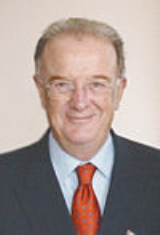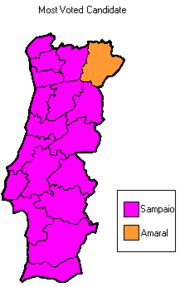
Portuguese presidential election, 2001
Encyclopedia
The Portuguese presidential election of 2001 was held on January 12.
The victory of incumbent president Jorge Branco de Sampaio was never in doubt and the turnout was therefore quite low (49.71%). Again, the incumbent president was reelected, like what happened with Mário Soares
and Ramalho Eanes.
As the election of a center-left president was almost certain, both the Portuguese Communist Party
and the Left Bloc, this last for the first time, presented their own candidates, as their support against the right wing candidate was not necessary. The Communist Party of the Portuguese Workers also presented its own candidate for the first time in its history, Garcia Pereira
.
On the right, Ferreira do Amaral
was supported by the two major parties, the Social Democratic Party
and the People's Party which, again, could not achieve their old objective of electing a right-wing president for the first time since the Carnation Revolution
.
There were also four candidates rejected by the Portuguese Constitutional Court
for not complying with the legal requirement of being proposed by 7500 voters:
These four candidates were present in the draw of the ballot position, but did not appear in the final ballot.
It was the first time Portuguese abroad could vote for the presidency.

The victory of incumbent president Jorge Branco de Sampaio was never in doubt and the turnout was therefore quite low (49.71%). Again, the incumbent president was reelected, like what happened with Mário Soares
Mário Soares
Mário Alberto Nobre Lopes Soares, GColTE, GCC, GColL, KE , Portuguese politician, served as Prime Minister of Portugal from 1976 to 1978 and from 1983 to 1985, and subsequently as the 17th President of Portugal from 1986 to 1996.-Family:...
and Ramalho Eanes.
As the election of a center-left president was almost certain, both the Portuguese Communist Party
Portuguese Communist Party
The Portuguese Communist Party is a major left-wing political party in Portugal. It is a Marxist-Leninist party, and its organization is based upon democratic centralism. The party also considers itself to be patriotic and internationalist....
and the Left Bloc, this last for the first time, presented their own candidates, as their support against the right wing candidate was not necessary. The Communist Party of the Portuguese Workers also presented its own candidate for the first time in its history, Garcia Pereira
Garcia Pereira
António Pestana Garcia Pereira is a Portuguese lawyer and politician, and the current leader of the maoist PCTP/MRPP. He was a candidate in the 2006 presidential election, where placed sixth and last with 0.44 per cent of the vote. He had already ran in the 2001 presidential election, getting 1.69...
.
On the right, Ferreira do Amaral
Ferreira do Amaral
Ferreira do Amaral may refer to:* João Maria Ferreira do Amaral , military and politician* Francisco Joaquim Ferreira do Amaral , military and politician, son of the above...
was supported by the two major parties, the Social Democratic Party
Social Democratic Party (Portugal)
The Social Democratic Party , is a centre-right liberal conservative political party in Portugal. It is commonly known by its initials, PSD; on ballot papers, its initials appear as PPD/PSD, with the first three letters coming from the party's original name, Democratic People's Party...
and the People's Party which, again, could not achieve their old objective of electing a right-wing president for the first time since the Carnation Revolution
Carnation Revolution
The Carnation Revolution , also referred to as the 25 de Abril , was a military coup started on 25 April 1974, in Lisbon, Portugal, coupled with an unanticipated and extensive campaign of civil resistance...
.
There were also four candidates rejected by the Portuguese Constitutional Court
Portuguese Constitutional Court
The Portuguese Constitutional Court is a special court, defined by the Portuguese Constitution as part of the judicial branch of the Portuguese political organization. Unlike the rest of the country's courts, the Constitutional Court has important characteristics, such as a special composition,...
for not complying with the legal requirement of being proposed by 7500 voters:
- Pedro Maria Braga
- Maria Teresa Lameiro
- Josué Rodrigues Pedro
- Manuel João Vieira
These four candidates were present in the draw of the ballot position, but did not appear in the final ballot.
It was the first time Portuguese abroad could vote for the presidency.
Candidates
- Jorge Sampaio, President since 1996, leader of the PSSocialist Party (Portugal)The Socialist Party , abbreviated to PS, is a social-democratic political party in Portugal. It was founded on 19 April 1973 in the German city of Bad Münstereifel, by militants from Portuguese Socialist Action ....
between 1989 and 1992, supported by the Socialist PartySocialist Party (Portugal)The Socialist Party , abbreviated to PS, is a social-democratic political party in Portugal. It was founded on 19 April 1973 in the German city of Bad Münstereifel, by militants from Portuguese Socialist Action ....
; - Joaquim Martins Ferreira do Amaral, former minister of public works of Cavaco Silva government between 1990 and 1995, supported by the Social Democratic PartySocial Democratic Party (Portugal)The Social Democratic Party , is a centre-right liberal conservative political party in Portugal. It is commonly known by its initials, PSD; on ballot papers, its initials appear as PPD/PSD, with the first three letters coming from the party's original name, Democratic People's Party...
and by the People's Party; - António Simões de AbreuAntónio Simões de AbreuAntónio Simões de Abreu, ComL, known simply by António Abreu is a Portuguese engineer and politician.He joined the Portuguese Communist Party in 1969. From 1969 to 1973 he was an active member of the democratic opposition to the Fascist regime of Marcello Caetano...
, alderman in Lisbon between 1997 and 2001, supported by the Portuguese Communist PartyPortuguese Communist PartyThe Portuguese Communist Party is a major left-wing political party in Portugal. It is a Marxist-Leninist party, and its organization is based upon democratic centralism. The party also considers itself to be patriotic and internationalist....
; - Fernando RosasFernando RosasFernando José Mendes Rosas is a Portuguese historian and politician.- Early life and education :Rosas was born on the April 18, 1946. He studied at the Pedro Nunes high school, and in 1961, he joined the school's Portuguese Communist Party organization, a party for which he was later a militant.He...
, Portuguese academic and politician, supported by the Left Bloc; - Garcia PereiraGarcia PereiraAntónio Pestana Garcia Pereira is a Portuguese lawyer and politician, and the current leader of the maoist PCTP/MRPP. He was a candidate in the 2006 presidential election, where placed sixth and last with 0.44 per cent of the vote. He had already ran in the 2001 presidential election, getting 1.69...
, Secretary-General of the PCTP/MRPP;
Results

External links
- Portuguese Electoral Commission
- NSD: European Election Database - Portugal publishes regional level election data; allows for comparisons of election results, 1990-2010
See also
- President of PortugalPresident of PortugalPortugal has been a republic since 1910, and since that time the head of state has been the president, whose official title is President of the Portuguese Republic ....
- PortugalPortugalPortugal , officially the Portuguese Republic is a country situated in southwestern Europe on the Iberian Peninsula. Portugal is the westernmost country of Europe, and is bordered by the Atlantic Ocean to the West and South and by Spain to the North and East. The Atlantic archipelagos of the...
- Politics of PortugalPolitics of PortugalPolitics in Portugal take place in a framework of a parliamentary representative democratic republic, whereby the Prime Minister is the head of government, and of a multi-party system. The President of the Republic is the head of state and has several significant political powers, which he...

